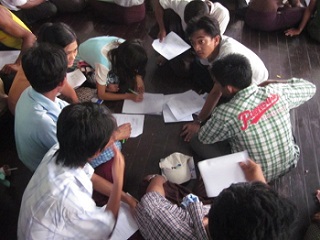Project
Civic Education and Civil Society Empowerment in Remote Areas in Myanmar
- Myanmar
- December 2012
The project general objective was to support the development of good governance in Myanmar through civic education and building advocacy skills of civil society. Activities included civic education trainings and township level meetings to support good governance; organization of core leader meetings; training in how to write policy papers to strengthen policy advocacy; and the creation of a website for civil society to exchange experience and knowledge. All quantifiable targets were reached or surpassed, and the participants interviewed spoke highly of the training. The project implementation team overcame significant bureaucratic and logistical obstacles, as well as difficult operating conditions. The project appears to have had a great deal of positive ‘knock-on effects’.
Although the training program attracted a large number of participants, participation was dictated by informal networks and affinities. The township-level forum did not succeed in soliciting initiatives and brainstorming on regional/local issues. Likewise, the policy papers exhibited significant weaknesses in particular a lack of readers. The website was also not used as an effective tool for knowledge and information sharing by any of the participants interviewed.
Lessons from Project
💡
- Community activism
- Myanmar
- December 2012
The township-level forums provided a space for free discussion, rather than a structured half-day session with solid results leading to a potential action plan and capacity to formulate initial issues for future policy papers. Participants were asked to state their mission, vision and goals, but no concrete deliverables or written action plans were produced. Much of the impetus built up during the training session was lost at the very moment where it would have been appropriate to draw up a concrete action plan. Also, there was no systematic support to the participants after the forums.

💡
- Community activism
- Myanmar
- December 2012
The project website was well organized and regularly updated but fell short of ‘promoting social mobilization’. None of the training participants interviewed ever used the website or were aware of its existence. While the content may be valuable, internet usage is lower in Myanmar than any other South East Asian country. The website has not been functional for a long period of time due to problems with the webhost supplier.
💡
- Community activism
- Myanmar
- December 2012
The greatest hindrance to efficiency was receiving government permission. In many instances the grantee received approval from higher-level government authorities to conduct training only a few days before the planned sections. In some instances, trainings were then postponed, cut short, or cancelled because permissions were revoked at the last minute or local officials had not been notified.
💡
- Community activism
- Myanmar
- December 2012
Research that addresses local concerns and brings them to the forefront of national debate is greatly needed. Although policy papers were drafted by September 2012, the papers’ quality was low, and the lack of dissemination wasted potential impact at states/regions level. The only distribution was a compendium of policy papers without foreword or explanation of the aim and the process which led to their drafting. Papers should be presented directly to local government, with abstracts published in local newspapers, and distributed widely to CSOs and political parties.
💡
- Community activism
- Myanmar
- December 2012
In the two focus groups held with ethnic minority participants, participants expressed problems in understanding in full the course content. Trainings were conducted in Burmese, rather than the participants’ mother tongue. As a result, some participants stated they attended multiple trainings in an effort to better understand the material.
💡
- Community activism
- Myanmar
- December 2012
Trainings were viewed as inflexible and were not tailored to regional issues. The same curriculum was used across all trainings, regardless of the local context. Training would have been more effective if it had not used a traditional lecture-based teaching style and allowed for more group discussion and consensus building. The number subjects covered should have been carefully assessed and on the basis of lessons learnt by trainers, trimmed down to a lesser number. Training would have gained in depth and in substance and could have had more value for participants.
💡
- Community activism
- Myanmar
- December 2012
The methodology for the Core Leader Meetings (CLM) changed due to circumstances. The first CLM consisted of participants from previous training sessions. It was originally thought that different audiences would participate in the following CLMs. However the poor outcome of the first CLM and the need to prepare consistent and coherent papers by the end of the project led to a change of approach. The three remaining CLMs were carried out with a mix of original participants, and more experienced writers/drafters.
💡
- Community activism
- Myanmar
- December 2012
Although the grantee lacked a systematic means of monitoring alumni activity, its 40,000 alumni stay closely connected via an alumni association. Although lines of causality are unclear, many programme participants are now more politically active. The grantee should have developed tools to monitor its two category target populations: young educated people, and more mature and experienced individuals.
💡
- Community activism
- Myanmar
- December 2012
The project created an initial impetus for political change at a regional level. Participants’ perception of government changed: they viewed themselves as rights-holders that can engage the government and hold it accountable. The project also created a desire for continued learning, for example in training institutes that participants and implementers themselves have created. These centers may continue to teach civic education after grantee funding and trainings have ceased. The subject material they teach is also likely to be specific to regional concerns and taught in the local language.